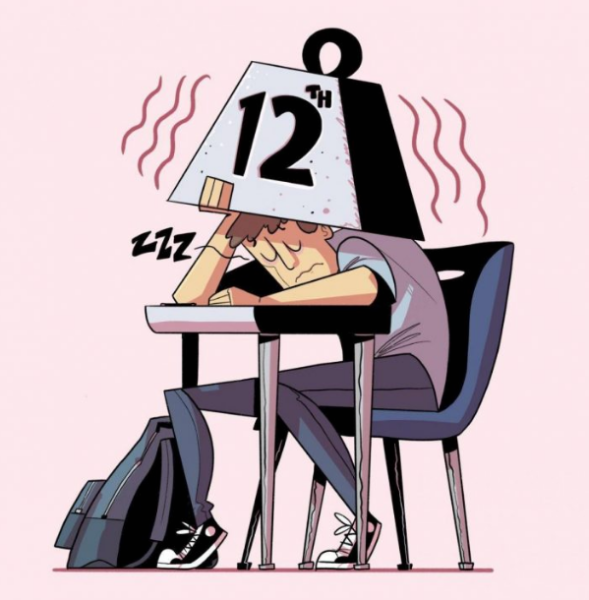Is APUSH too much of a push for freshmen?
One of the listed accomplishments on Springbrook High School’s website is that the school has the highest number of freshmen students enrolled in Advanced Placement United States History (APUSH). However, this fact is not something to brag about due to the number of students failing the exam.
AP exams are graded on a scale from 1 to 5, with 1 being the lowest possible score and 5 being the highest. A 3 is considered a passing score.
While a 3 is considered a passing score on an AP exam, several local colleges will only accept a score of 4 or 5 for credit for certain subjects.
The University of Maryland, College Park and Towson University require at least a 4 on the APUSH exam in order to receive credit. However, the University of Maryland, Baltimore Country and Salisbury University accept a score of 3 and above.
According to the College Board, the company that creates the curricula for AP classes and the AP exams, “9th grade students are not sufficiently prepared to participate in a college-level course,” and Springbrook’s data only supports this statement.
In 2012, the APUSH exam had a national average of 2.80. Maryland’s average for this exam was 2.84. Montgomery County Public Schools (MCPS) achieved an average of 3.3. However, Springbrook’s average during 2012 for this exam was 2.0 and only 26.2% of students received an AP score higher than a 2.
Springbrook had the second lowest average score and percent of students passing out of all MCPS high schools. The APUSH exam also had the second worst average score out of all the AP exams Springbrook students took in 2012.
Despite this data, counselors and teachers still recommend freshmen to take this course.
“We want to offer it [APUSH] to kids who want to challenge themselves,” Social Studies Resource teacher Mark Pim said.
The grades APUSH students receive often do not have a negative impact on their transcript.
“There’s a higher percentage of kids earning A’s and B’s still in the AP class, close to 85% percent, higher than what we have in our honors classes, which is more around probably 65% getting A’s and B’s,” Pim stated. “In terms of what goes on their transcript, what colleges see, and what is still even weighed for GPA, their performance is not hurting them in long run.”
Although a higher percentage of APUSH students are receiving better grades than those who take honors, this only shows that many students are not prepared to take the exam. If the 85% of students that get A’s and B’s in APUSH were prepared, then why are only 26.2% of Springbrook students passing?
Even though students are not required to report their AP scores when applying to college, the Common Application, an online application that over 500 colleges use, allows students to self report their AP scores. If colleges see that a student took APUSH on that student’s transcript, but that student did not report their score, there is a possibility that the colleges will automatically assume that the student did poorly on the exam.
In 2013, the APUSH exam was the fourth most failed AP exam nationally with an average of 2.77. This data clearly shows that the APUSH exam is one of the most difficult AP exams to pass no matter what grade you are in.
When freshmen take this course at the beginning of high school, they do not expect the amount of work they need to do in order to excel in this class, and are surprised when it is more difficult than they believed it would be.
“It’s a huge jump from eighth grade. It’s a lot of reading and way harder to manage than I thought it would be when I signed up for it,” freshman Bernadette Palma said.
Expecting these students to go from a middle school course to a college level course is unreasonable. Freshmen should be adjusting to their high school level courses, that are more rigorous than the classes they took in middle school, instead of struggling in a college level course where they have a slim chance of passing the exam.
Some of Springbrook’s freshmen feel that they were pressured into taking this class by their peers and teachers. They also feel mislead because they were not told that the national average for the APUSH exam was so low, and that Springbrook’s average was even lower.
“I thought it was weird that I was told to take a college level course as a 14 year old. But I went with it because all my friends were doing it, and my counselors and teachers said to,” an APUSH student that wishes to remain anonymous stated. “Finding out that the test is so hard to pass for everyone, not just freshmen, and that Springbrook had a pretty low average makes me feel tricked into taking the course because they didn’t mention that before.”
However, Pim claims that information about APUSH is discussed during back to school night. Even though the department talks about APUSH during back to school night, this is an event only some parents and students are able to attend.
Students that took the class in past years also feel that it was not a good decision.
“It was a waste of $80. I really wish I hadn’t done it because it took up so much of my time, cost a lot of money to take the exam, and it was all for nothing,” junior Janet Kim said.
Even though it is a difficult class, some upperclassmen still believe freshmen should take APUSH.
“I think they should take it because it gives them a head start on how to work in an AP class,” senior Adriana Gomes explained. “It’s okay if you don’t do well the first time because you’ll have more opportunities during your other three years.”
Pim also explains that another reason Springbrook offers APUSH is to prepare students to take the other higher level history classes.
Springbrook’s average scores for AP US Government and Politics (2.5), referred to as AP National State Local (NSL) throughout MCPS high schools, and AP World History (APWH) (2.5), two other history classes Springbrook students usually take in their sophomore and junior year respectively, were higher than the average score for APUSH in 2012. However, Springbrook’s averages for these two exams were still lower than the national average, Maryland average and MCPS average of that year.
Although the AP NSL and APWH averages were higher than the APUSH average in 2012, the AP Psychology average, an AP history course students usually take in their junior or senior year, was the same as the APUSH average.
Yes, by taking APUSH, freshmen can learn how to manage their time in order to succeed in an AP class, but why can’t students learn how to work in an AP class later on in their high school careers?
Overall, students will be more prepared to take AP classes during their junior or senior year of high school because they will have adapted to their high school courses and could manage the rigor of a course like APUSH.
But freshmen that are currently taking the course should not be discouraged. Although passing the AP exam as a freshman is difficult, it is not impossible.
According to Adrienne D’orazio, one of Springbrook’s APUSH teachers, Springbrook’s average score for the APUSH exam in 2014 was a 2.028. Although no students got a 5 on the APUSH exam, several students did receive a 3 or 4.
In order to pass the AP exam as a freshman, students must take this class seriously, but many freshmen do not.
“When I was a freshman in AP US History, no one read that texbook,” senior Aliyah Shah said.
Although getting a passing score on the AP exam as a freshman is impressive, freshmen students should only take this course if they are willing to work to do well. For many AP courses, it necessary to self study and to read the textbook. You can not rely on your teacher to give you all the information in class because there is too much material to cover. Do not take this course if you do not plan to try your best. You will only end up wasting your time.
In order to help freshmen make the decision on whether or not taking APUSH is the best choice for them, it is important that Springbrook and the middle school counselors and teachers tell students exactly what type of class they are signing up for. All students recommended for APUSH should have a mandatory meeting with their counselors where they learn all the facts about APUSH, and decide whether or not they want to take the class in the first year of high school.



